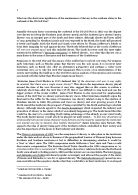Some Northerners didn’t want the South to secede and wanted to maintain the United States as a whole; they were considered Unionists. One unionist was a senator named Daniel Webster. He made a speech during the debate in the Senate concerning the Compromise of 1850 (Speech of Daniel Webster). His point of view and reason behind his speech was to preserve the Union. Daniel Webster believed that if the South were to secede United States would make no sense and it would be impossible to draw a borderline. The senator also emphasized that the democratic system the United States was using was beneficial in all the states and will continue to be as American settlers expand across the continent (Speech of Daniel Webster). Daniel Webster didn’t want the South to secede and so he wanted the North to support the stricter Fugitive State Act (Jordan 327). Not only did politicians like Daniel Webster want the Union to stay intact but also common workers and farmers approved the 1850 compromise so the Union would not break up (Levine 396).
While some Northerners had the interest of the Union at heart other Northerners at the time wanted to get rid of slavery in the nation; they were considered abolitionists. When Frederick Douglas presented his speech, “The Meaning of July Fourth for the Negro” he explained that the whole point of the holiday is to celebrate the notion that all people within the country are free from the chains and bondage that was imposed upon them by Great Britain. Yet he emphasizes that while the white colonists are celebrating freedom, slaves are being reminded on this holiday that they are held captive to great injustice, brutality, and being stripped of free rights. To help the slaves get freedom abolitionist had “local vigilance committees” which helped keep the Underground Railroad, pathway for slaves to escape the South, operational (Levine 395). While ordinary workers and farmers were hoping the Compromise of 1850 would make sure the Union stays intact, abolitionist were having huge meetings where they attacked the compromise for keeping slavery in the growing West and for the compromise having a Fugitive Slave Act (Levine 396).
Women also played big roles within the abolitionist movement. At the same time reform movements were occurring that redefined the idea of equality for people. This both women and the reform movement were based on the ideas of evangelical Christianity, which advocated an immediate end to slavery. (Norton 278B). Abolitionists who were evangelical Christians created a bridge between reform and politics. Two types of abolitionists existed. One was gradualists which sought the end of slavery through gradual and legal means. They tried convincing slaveholders that slavery was morally wrong and unethical through persistent pressure. One of the things they did was help establish a colony in Liberia were slaves can be sent instead of living in America (Norton 278B). Examples of gradualists were Thomas Jefferson, The American Colonization Society, and other slaveholders. The other type was immediatists who demanded an immediate ban to slavery. Because of the immediatists’ motivation, “their zeal made them forceful political activists” (Norton 278). For example when Congress implemented the gag rule, a means of prevent debate on slavery, gradualists weren’t able to get their point across and so immediatists stepped in and sent “nearly seven hundred thousand petitions” in Congress to stop the gag rule. Examples of immediatists included William Lloyd Garrison, Frederick Douglas and also Harriet Tubman.
Some Northerners were upset with slavery because it was taking away jobs that regular Northerners could get; these people were known as free-soilers. United States was active in their search and acquisition for land. Congressman David Wilmot proposed an amendment that “neither slavery nor involuntary servitude shall exist in any part of the land taken from Mexico” (Jordan 324). This was called the Wilmot Proviso. The inspiration for this proviso did not start from any abolitionist feeling on the part of Wilmot, but rather from a desire that the territories that were acquired from Mexico be settled by free white farmers, who also would no longer have to face opposition from the huge slave plantations. Free-soilers didn’t think slavery was wrong, but they didn’t like African Americans and believed that if there was no slavery then there would be fewer of African Americans in the states. The prejudice stems from the economic concept of slave labor versus “free labor” (Norton 359). In slave labor a slave works for nothing while a free labor man works like a slave to get a little money. Free-soilers wanted to keep the African Americans out of the West and wanted slavery of out the West. Free-soilers also feared that slaves would ruin the lands in the West as they have nothing to lose and don’t have a care for America (Norton 249). All Northerners in general didn’t want the South getting power through legislation involving slaves as property. This infuriated the South greatly, as it guided them to consider that the North was trying to eliminate slavery as America expanded west while the South viewed the west influential in expanding slavery throughout America.
In 1858, Abraham Lincoln gave an address called the House Divided Speech in which he states “A house divided against itself cannot stand. I believe this government cannot endure, permanently, half slave and half free” (Norton 320). However the house was indeed dividing, as Northerners (abolitionists, free-soilers, and Unionist) wanted to eliminate slavery while Southerners wanted slavery to expand throughout the land. Slavery was becoming a prominent issue within America and one that would be ultimately decided by a bloody civil war.
Word Count: 1376







